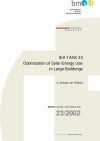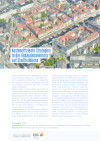Suchergebnisse
IEA SHC Task 59/EBC Annex 76: Integration of Energy-Efficient Ventilation Systems in Historic Buildings—Review and Proposal of a Systematic Intervention Approach (2021)

Integration energieeffizienter Lüftungsanlagen in historischen Gebäuden unter Berücksichtigung einer systematischen Bewertung anhand der EN 16883:2017
Rieser A, Pfluger R, Troi A, Herrera-Avellanosa D, Thomsen KE, Rose J, Arsan ZD, Akkurt GG, Kopeinig G, Guyot G, Chung D.
Herausgeber: Sustainability. 2021
Englisch
IEA Task 23 Optimization of Solar Energy Use in Large Buildings

Schriftenreihe
23/2002
S. Geissler, W. Tritthart
Deutsch, 235 Seiten
Downloads zur Publikation
ECBCS Handbuch für energieeffiziente Beleuchtung

Das Handbuch für energieeffiziente Beleuchtung des ECBCS Programms widmet sich dem Thema Lichtenergie in Gebäuden.
Integrale Energiekonzepte für nachhaltige Gebäude (Seerig/Blümel, 2007)

Ein Bewertungsansatz mittels Simulation, IEA ECBCS Annex 44
Artikel aus erneuerbare energie - Zeitschrift für eine nachhaltige Energiezukunft 3-07
Deutsch
IEA EBC Annex 68 Webinar: Küchendunstabzüge in Kombination mit Wohnraumlüftung (2021)

Dieser Vortrag präsentiert ausgewählte Erkenntnisse bzw. Beiträge aus diesem IEA Projekt zum Thema raumluftqualitätsoptimierte Planung und Betriebsführung von energieeffizienten Wohngebäuden.
Herausgeber: bauinformation.com
Deutsch
IEA EBC Annex 61 Subtask D Report: Deep Energy Retrofit Guide for Decision Makers (2017)

Der Bericht stellt eine Zusammenfassung der Ergebnisse und Erkenntnisse aus den einzelnen Subtasks dar.
Alexander Zhivov, Lohse Rüdiger
Herausgeber: New Buildings Institute (NBI)
Englisch, 76 Seiten
Downloads zur Publikation
IEA EBC Annex 83: Qualitative Assessment Methodology for Positive Energy District Planning Guidelines (2022)

Dieses Konferenzpapier präsentiert eine Analyse des aktuellen Stands der Technik bei Richtlinien zur Planung und Umsetzung von Positive Energy Districts (PED), basierend auf der Analyse von 25 PED-Richtlinien.
Hans-Martin Neumann; Sergio Díaz Garayo; Niki Gaitani; Daniele Vettorato; Laura Aelenei; Judith Borsboom; Ghazal Etminan; Anna Kozlowska; Francesco Reda; Jørgen Rose; Pekka Tuominen
Herausgeber: IEA EBC Annex 83
Englisch
PEDs - Positive Energy Districts: Essentielle Komponenten für eine "Net Zero" City
2. Februar 2023, 13:00-15:00
Digital, AT
Dieser digitale Stakeholder-Workshop geht der Frage nach, welche Beiträge das internationale Netzwerk zu Positive Energy Districts (IEA EBC Annex 83) zum Ziel "Net Zero by 2050" leisten kann und wie diese Aktivitäten mit österreichischen Initiativen vernetzt werden können.
VERSCHOBEN: Webinar - Datengetriebene Betriebsoptimierung und Effizienzcharakterisierung von Gebäuden
31. März 2022 verschoben
Online
Das ursprünglich für 31. März geplante Webinar kann leider nicht mehr als solches auf der Plattform bauinformation.com durchgeführt werden. Die Vorträge werden im Rahmen einer Session in der e-nova 2021 Konferenz am 2. Juni 2022, in Pinkafeld gehalten.
IEA EBC Annex 58: Report of Subtask 3, part 1: Thermal performance characterization based on full scale testing – description of the common exercises and physical guidelines

Dieser Bericht dokumentiert verschiedene Fallstudien, wo mit Hilfe dynamischer Datenanalyse Testobjekte unterschiedlicher Komplexität charakterisiert wurden und leitet Hilfestellungen für den Versuchsaufbau ab.
María José Jiménez (ed.)
Herausgeber: KU Leuven
Englisch, 176 Seiten
Downloads zur Publikation
IEA EBC Annex 81: Artikel in der Zeitschrift "nachhaltige technologien" Ausgabe 04-2020: Internationale Kooperation für "Datengesteuerte intelligente Gebäude"

In IEA EBC Annex 81 ist das Hauptziel, Digitalisierung im Gebäudebereich zu nutzen, um Kosten zu senken und die Energieeffizienz durch einen optimierten Betrieb von Heiz-, Kühl und Lüftungssystemen zu optimieren.
(nachhaltige technologien 04-2020, Seite 24)
Herausgeber: AEE - Dachverband
Deutsch, 3 Seiten
Artikel in der Zeitschrift "nachhaltige technologien" Ausgabe 2018-2: Kosteneffiziente Strategien in der Gebäudesanierung auf Stadtteilebene

Im Artikel wird das Projekt IEA EBC Annex 75 zur Entwicklung von kosteneffizienten Strategien in der Gebäudesanierung auf Stadtteilebene dargestellt.
Herausgeber: AEE - Dachverband
Deutsch, 1 Seiten
Downloads zur Publikation
Towards the definition of indicators for assessment of indoor air quality and energy performance in low-energy residential buildings

Im Rahmen des IEA EBC Annex 68, Subtask 1 sollte ein Index zur Bewertung der Raumluftqualität und Energieeffizienz entwickelt werden. Die Ergebnisse aus diesen Arbeiten werden in dieser Publikation zusammengefasst.
Louis C. R. Salis, Marc Abadie, Pawel Wargocki, Carsten Rode
Herausgeber: Energy and Buildings, Volume 152 (492-502)
Englisch, 11 Seiten
IEA EBC Annex 61 Subtask A report: Deep Energy Retrofit - A Guide to Achieving Significant Energy Use Reduction with Major Renovation Projects (2017)

Der Bericht gibt einen umfassenden Überblick über die wichtigsten ökonomischen und technischen Konzepte für die hochwertige Sanierung von öffentlichen Gebäuden.
Alexander Zhivov, Lohse Rüdiger
Herausgeber: New Buildings Institute (NBI)
Englisch, 522 Seiten
Downloads zur Publikation
Webinar "Using Metal Oxide Semiconductor (MOS) sensors to measure Volatile Organic Compounds (VOC) for ventilation control"

Teilnehmer der IEA EBC Annex 68 präsentieren in diesem Webinar erste Forschungsergebnisse und Ihre Einschätzung in Bezug auf die Verwendung von Metalloxid-Sensoren (MOS) für die Regelung von Lüftungsanlagen.
Herausgeber: Air Infiltration and Ventilation Centre (AIVC)
Englisch
IEA EBC Annex 86: AIVC 2022 Konferenzbeitrag "Assessing demand-controlled ventilation strategies based on one CO2 sensor"

Der Konferenzbeitrag zeigt die Möglichkeiten und Grenzen einer bedarfsgeführten Lüftungsregelung welche auf einem zentral angeordneten CO2 Sensor, z.B. im Abluftkanal, basiert.
Gabriel Rojas
Herausgeber: AIVC Konferenzbeitrag
Englisch
IEA SHC Task 59: Experimental measurement of materials drying coefficient for internal insulation: new approaches for laboratory testing (2021)

Experimentelle Messung des Trocknungskoeffizienten von Materialien für die Innendämmung: neue Ansätze für Labortests.
Alexander Rieser, Daniel Herrera -Avellanosa, Eleonora Leonardi, Marco Larcher, Rainer Pfluger, Alexandra Troi
Herausgeber: SBE 21 Heritage Konferenz Bozen
Englisch, 8 Seiten
IEA EBC Annex 58: Report of Subtask 4a: Empirical validation of common building energy simulation models based on in situ dynamic data

Dieser Bericht dokumentiert die im Rahmen dieses Annexes durchgeführte messtechnische Validierung verschiedener dynamischer Gebäudesimulationsprogramme.
Paul Strachan, Katalin Svehla, Matthias Kersken, Ingo Heusler
Herausgeber: KU Leuven
Englisch, 70 Seiten
Downloads zur Publikation
IEA EBC Annex 58: Report of Subtask 4b: Towards a characterisation of buildings based on in situ testing and smart meter readings and potential for applications in smart grids

Dieser Bericht bietet einen Über- und Ausblick über mögliche Anwendungsfälle der in diesem Annex erarbeiteten Charakterisierungsmethoden.
Dirk Saelens, Glenn Reynders
Herausgeber: KU Leuven
Englisch, 35 Seiten
Downloads zur Publikation
IEA-EBC Annex 56: Methodology for Cost-Effective Energy and Carbon Emissions Optimization in Building Renovation

Der Bericht beinhaltet die Beschreibung der Berechnungsmethodik, welche im IEA-EBC Annex 56 entwickelt und anhand generischer Gebäude sowie tatsächlicher Gebäudesanierungen getestet wurde.
Walter Ott, Roman Bolliger, Volker Ritter, Stéphane Citherlet, Didier Favre, Blaise Perriset, Manuela de Almeida, Marco Ferreira
Herausgeber: IEA EBC Annex 56
Englisch, 210 Seiten
